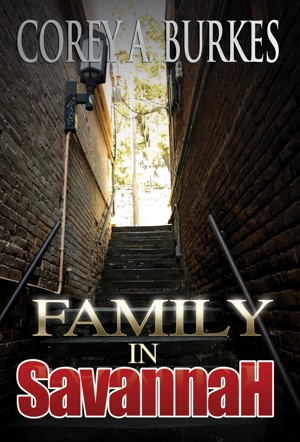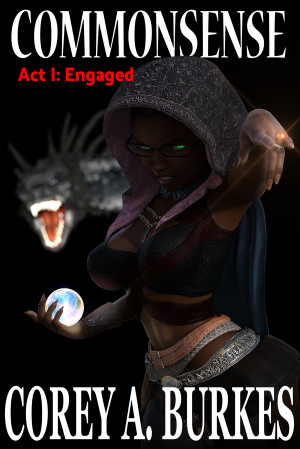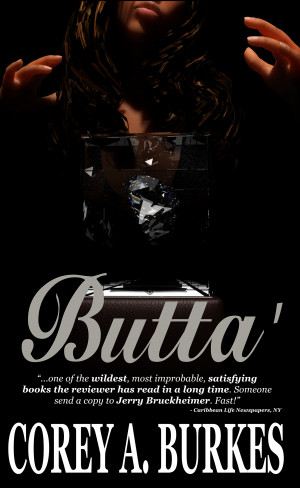Interview with Corey Aaron Burkes
Published 2019-11-27.
Where did you grow up, and how did this influence your writing?
I grew up in Jamaica, Queens New York with only a handful of friends from two different neighborhoods.
You see, my mother didn't like me going to the schools in our area, so she worked hard to get me into schools way across town in Floral Park, NY. As a result, my perspective of life is quite diverse. During that time, it was quite probable that one culture had no clue about another unless they were put together at the same job or school. It was quite unfortunate as, in most cases, I was the only African-American person they ever met.
Vice-verse, too. Friends around where I lived may have only associated with someone Caucasian from a teacher, watching TV or going to a mall.
All the same, it's there that I made lifelong friends with different tempos of living that inspired my writing to be more than just one point of view.
When did you first start writing?
At age five. Unfortunately, my mother (working two-three jobs at the time) didn't have that kind of time to read my chicken-scratch.
Then, right after I saw Star Wars for the first time (1977) and saw how it affected my mother. She was transported, as I think we all were.
My goals were to write stories that would get her attention like that movie did. I guess you can say I have spent the rest of my life trying to get her, or anyone reading my work, to feel transported.
Why did you stop publishing Amazon?
Amazon KDP and I had a long, strange history. I was publishing there since practically day one. In the early days (around 2007-2010), you could publish a book up there and get honest reviews. Then, something changed.
I stopped getting reviews for my work. The last review was in 2013. Now, I was caught in the middle of feeling whether my work just wasn't good enough to get a good, bad or indifferent review ... or something was legitimately wrong. If I complained, I would only sound like an angry author.
Some will argue that reviews don't sell books. I tell you that reviews are one of a few necessary tools to sell books. At the very least, it helps the reader know what others think. A quick judgment if it's 'worth it'.
Earlier this year, it came to my attention that readers were being prevented from placing a review with zero reasons why. I reached out to amazon: no results.
When I posted around in Amazon author communities about the problem, other authors came off as if I shouldn't complain and 'that's just the way it is'. Never have I felt defeated and disillusioned by the field of authors out there that just accepted the problem. Well, it wasn't their problem so tough luck.
Then someone tried to tell me maybe they stopped my reviews because maybe too many people reading advanced copies tried to post all at once. If I operated that way, I would agree. But I guess when top bestselling authors get 1,000 reviews before the book even comes out --- it's okay for them to keep their reviews.
So, I was done with Amazon. Evidence of readers and buyers were there, but if they want to keep collecting money off me and not help me with a problem that was important to me, then I was done.
I'm moving all my work over to Smashwords and I'll never look back again.
What motivated you to become an indie author?
I wanted something tangible for my children to have when I'm gone. It's important to me that they know their dad had an incredible imagination.
Also, in the earlier years, I did the whole 'submit query letters' routine to publishers and received constant rejections. That kind of motivation to be an indie author is real; especially when my work is doing better than the gate keepers expected.
How has Smashwords contributed to your success?
By being a successful alternative to Amazon.
What is the greatest joy of writing for you?
Knowing when a reader is taken away and enjoying the characters. Which goes back to my earlier answer on 'reviews'. I don't know how a reader feels unless they tell me. In many ways, I would do this work for free if I knew people read my work and felt something about it.
What do your fans mean to you?
They mean a lot. Writing can be a 'service' provided just for them. When they aren't feeling well. Or if someone just lost their job or divorced ... what can my writing be for them to give them a momentary entertaining distraction?
I work for the fans and it's a pleasure.
What are you working on next?
Right now, as of November 2019, I am purging Amazon of my work and re-routing into Smashwords. Some work I had there were probably hidden from the world anyway, so it will be brand new here.
Additionally, I'm producing everything as audio theater dramas. Not necessarily 'audio books', as that would imply I'm selling the audio. These will be podcasts on Spotify, Soundcloud, Apple Podcasts, etc. of the novels, broken up into parts or chapters with a full ensemble cast of voices.
The first to come out will be February 2020 - CommonSense - Act I: Engaged, a three-part eBook and podcast. This is to test the waters and gather feedback before the longer works over the year.
Ideally, PodcastPerformances.com will perpetually develop audio stories for everyone to continue listening to.
When you're not writing, how do you spend your time?
I work on the weekly podcast 'Toy Flavor Radio: Soundtracks', where we play intros, outros and mid-tracks to your favorite TV shows, movies and anime. (https://soundcloud.com/toyflavorradio).
What is your writing process?
I usually start with thinking over the general idea for a few weeks. Visually playing with the concept until I feel I can't think of another way to open or end the story. Sometimes I build from inside out: maybe one idea that I think is cool and build off it until it finally becomes a worth story.
Eventually, it gets to paper as an outline. All my stories start off as a movie-ish feel and it's my job to NOT write a script but break everything into a fluent path.
This outline is broken into chapters. Basically 'This part goes in chapter one, that part goes into chapter two, etc., etc.'. Yeah, it sounds clunky. It works.
In all my writing, I keep a flow that needs to stay consistent to manage the readers emotions. So, breaking at the right points is kind of like mini-cliffhangers between chapters.
Once I have all the chapters laid out (thus a finished blueprint of the novel), I start writing those blocks of chapters. The way I just wrote that last paragraph made it sound like it's an easy process. A few other micro personal things also need to happen:
1) I can't be stressed out.
2) I shut down all social media access. How can I write for myself if I'm arguing with fools on Facebook? I remember telling that same line to another author Facebook. She went ahead and told me she can multitask. Do you know she has YET to release her book but she's always on Facebook, though? I since put out three stories since.
3) Need my collection of instrumental music to zone out. I'm extremely partial to John Williams Schindler's List soundtrack.
How do you approach cover design?
I've had some experience with designing covers for others. There are about 40+ overs out there I created that I'm proud of.
Typically, the author of the novel should NOT come up with ideas for their book cover. Give the artist freedom to express what should be there especially if that artist knows the business of catching eyes. You don't get advice from the screenwriter on how the movie poster should look like. Not at the professional level of production.
But here we are at the indie level so the author tends to be all-up-in-everything. I'm no exception, so I completely understand both sides of this coin. I know what I want for my covers, so I don't look for someone to do the work I can do myself. Fortunately, I can do it for myself.
Like my writing, I am thinking in terms of the cinema. What would be eye-catching if you were going to the movies.
Smashwords Interviews are created by the profiled author or publisher.
Books by This Author
Family in Savannah
by Corey Aaron Burkes
Three Savannah families intertwined by a serial killer and a homeland terror plot spreading fear throughout the city during the holidays—troubling a young man’s attempt to redeem himself among his estranged family, frustrating a mother’s search for her kidnapped daughter, and the nurturing elementary school teacher—gripped by the immeasurable loss of one of her students to a kidnapper.
CommonSense Act I: Engaged
by Corey Aaron Burkes
What would you do if you were granted unlimited magical powers? There is a seed from the thought-to-be mythical Tree of Knowledge --- with the ability to change a non-magic user to a sorcerer --- in the possession of college student and necro-new witch, Mildred Common. Recently engaged, her plans for a peaceful life will be challenged by powerful magic users hunting for her and the seed.
Butta'
by Corey Aaron Burkes
A nine-year-old girl grows up to be a drop-dead gorgeous and skilled thief to avenge the death of her family by arranging a heist of a maximum security diamond vault owned by the man who stole her father’s invention. With her trusted crew of talented thieves, Butta' takes on the world's richest man in the most exciting diamond caper ever in print.



